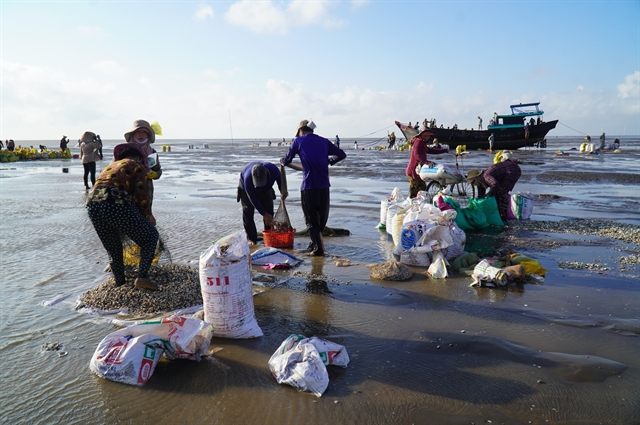 Society
Society

 |
| Farmers harvest clams in Thới Thuận Commune in Bến Tre Province’s Bình Đại District. – VNA/VNS Photo Công Trí |
BẾN TRE – Bến Tre Province will give priority to develop its marine economy, aiming to become the Cửu Long (Mekong) Delta’s leading province in developing a marine economy strongly and sustainably from now to 2030.
Nguyễn Minh Cảnh, deputy chairman of the provincial People’s Committee, said the province will focus on developing renewable energy, aquaculture and tourism in coastal areas.
It will develop ecological marine culture, adapt to climate change, protect marine environment, prevent coastal erosion, and preserve and promote marine ecology, he said.
The province will prioritise giving marine space for developing renewable energy and new marine economy sectors that are environmental friendly, and assist investors to speed up investing in zoned wind power projects from now to 2030.
It aims the output of solar and wind power will reach 1,500MW in 2025 and 3,000MW in 2030.
In aquaculture, the province will develop high-tech, biosafety and environmental friendly aquaculture from now to 2030.
It aims aquaculture will achieve an output of 136,000 tonnes in 2030 and earn a production value of VNĐ450 million (US$18,400) per hectare a year.
It will develop 5,100ha high-teach farming areas for breeding aquatic species and producing their fry by 2030.
All concentrated aquaculture areas for breeding key aquatic species will get Vietnamese good agricultural practices (VietGAP) or equivalent standards.
The province now has 3,067ha of high-tech marine shrimp breeding areas with an annual output of more than 128,000 tonnes.
Shrimp is one of the province’s key aquatic species.
The province will upgrade inspection data management systems for fishing boats, and manage and develop fishing boats in according to their granted licenses.
It will improve the service quality of fishing ports and storm shelters for fishing boats, and the service quality of establishments that produce and repair fishing boats and offer logistic services for fishing boats.
It aims for the tourism revenue of its three coastal districts to increase by 25 per cent a year from now to 2030, accounting for 20 per cent of the province’s total tourism revenue.
By 2030, the tourism revenue of its three coastal districts will account for 30 per cent of the province’s total tourism revenue.
The province will develop road systems to increase connection with the delta’s other provinces, the southern key economic zone, and districts, cities and economic zones in coastal areas.
It will co-operate with the neighbouring provinces of Tiền Giang and Trà Vinh to build a coastal road running through the three provinces.
It will co-operate with Vĩnh Long Province to build the Đình Khao bridge on National Highway No. 57 to connect the two provinces.
It will co-operate with Tiền Giang to build Rạch Miễu No.2 bridge to link the two provinces.
To reach these targets, the province will implement synchronous solutions, including completing legal regulations on natural resource management and marine environment protection, according to its People’s Committee.
It will proactively increase international co-operation for managing and researching marine resources and environments, develop human resources for the marine economy, and increase investment, especially private, collective and foreign investment.
It will prioritise using State budget to invest in infrastructure for developing marine economy, especially infrastructure for transport, sea ports, aquaculture, fishing, industrial parks and industrial park clusters in coastal areas. – VNS




